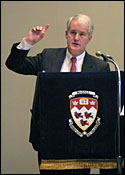Looking to the skies
Like most North Americans, Paul Dempsey remembers exactly where he was when he heard about the World Trade Center attacks on September 11.
 Professor Paul Dempsey, director-designate of the Institute of Air and Space Law
Professor Paul Dempsey, director-designate of the Institute of Air and Space LawPHOTO: Owen Egan |
|
"I had been trying to find the Teletubbies on television for my son," he said. "I kept seeing this image of the tower on fire, and I thought 'Well, that's an interesting special effect.'"
When the truth of what was happening finally hit home over the course of the day -- a second plane, the Pentagon attack, the collapsing of the towers, the heroes of the Pennsylvania crash -- he was flabbergasted.
"As a student of commercial aviation I knew that the world had changed, and changed irrecoverably," he said.
Dempsey has thought long and hard about the implications of these changes -- and as the director-designate of McGill's Institute of Air and Space Law (IASL), he visited the University last Saturday to deliver an unsettling vision of the future of aviation to over 200 air and space law specialists.
All in attendance were graduates of the institute, in town to celebrate the 50th anniversary of the IASL at a special conference.
Dempsey's appointment is actually a bit of a homecoming -- he received his doctorate from the IASL. He went on to become one of the foremost American authorities on air transport, writing nearly a dozen books on the subject, as well as appearing as a commentator in various media outlets, and working as a consultant for private and public aviation and transport organizations.
"I think the institute has a marvelous opportunity to serve the air and space community and government in providing leadership at a very critical moment in history," he said in an interview with the Reporter.
"It has enormous potential as the premier institution in its field. McGill has several things that no other civil aviation institute has -- for instance, the International Civil Aviation Organization is in Montreal and nowhere else, the International Air Transport Association is in Montreal and nowhere else.
"This institute also has a 50-year history, with graduates in 150 countries around the world who are intensely loyal to this University."
That Dempsey will be a Tomlinson Chair indicates that McGill is recognizing the new importance of the IASL. For his part, Dempsey intends to ensure that the institute remains relevant in a rapidly changing field.
He plans to poll graduates to ascertain how relevant the institute's curriculum is to the issues they face in their day-to-day practice.
"Beyond that we need to make sure we're offering educational opportunities for members of the bar, and an ample supply of quality scholarship that contributes to the development of air and space law," he said.
In his Saturday presentation, Dempsey cautioned that no matter how prepared we think we are, the unexpected will always happen.
"We have a tendency to fight the last war," he said. "The French did that with the Maginot Line, preparing for trench warfare. They were very quickly overrun by the German blitzkrieg."
Airline security is much like that. Dempsey does not believe it is possible to make the airlines impervious to terrorist attack. He pointed out that after measures were put in place to prevent a rash of hijackings in the '60s and '70s, terrorists simply began planting bombs.
Once we started screening for bombs, tactics changed to those of September 11.
"Even if we make air travel perfectly secure, these people will just find another target that is less secure, such as railway stations, or bus terminals," he said.
To counter possible threats to airline safety, Dempsey said we need to think outside the box.
Sealing off the cockpit and adding air marshals to flights won't solve anything in the long run. Passenger vigilantism is more likely to thwart hijacking attempts like September 11 -- just as it did Richard Reid, the "shoe bomber," whose attempt to set off an explosive hidden in his footwear was stopped by fellow passengers.
The United States government does not have a good record in proactively dealing with security holes -- screening procedures that were supposed to be implemented after the Pan/Am explosion over Lockerbie, Scotland, were not in place for a full decade after the explosion. Some security measures were never implemented at all.
"Aviation security has never been taken as seriously as it should be," he said.
On the other hand, the importance of public confidence in a healthy airline industry was recognized immediately after the WTC attacks -- Congress had approved a $15 billion industry bailout within 30 days of the tragedy.
The problem with implementing security measures that are effective is that they tend to throw the conflict between public safety and individual rights into sharp relief. Dempsey said that we may all soon be forced to undergo background checks, reveal political affiliations, and explain our travel histories before we will be allowed to board a plane in the future.
"Some of the most effective things we can do are some of the most damning encroachments upon privacy," he said. "How far are we going to go in terms of profiling people ... and what kinds of information are we going to be interested in?"

